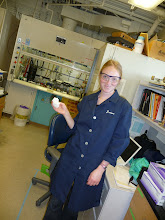Ever wonder why inhaling helium from a balloon increased the pitch of your voice?
The pitch of your voice depends on many factors: the shape of your throat, mouth, nasal passages, etc. But most importantly, it depends on the gas present in your lungs. Under normal circumstances, the gas in your lungs is air. The speed of sound through air at 20°C is roughly 343 m/s (the temperature in your lungs is a little bit hotter, so the speed of sound through the air in your lungs is actually about 353 m/s).
The pitch of your voice depends on many factors: the shape of your throat, mouth, nasal passages, etc. But most importantly, it depends on the gas present in your lungs. Under normal circumstances, the gas in your lungs is air. The speed of sound through air at 20°C is roughly 343 m/s (the temperature in your lungs is a little bit hotter, so the speed of sound through the air in your lungs is actually about 353 m/s).
What if the gas in your lungs is helium?
In general, the speed of sound, v, in a gas with molar mass M and adiabatic constant γ (which depends on the gas), at temperature T, is given by:
 where R is the ideal gas constant (8.314 J·K-1·mol-1).
where R is the ideal gas constant (8.314 J·K-1·mol-1).
For Helium, M is about 4 g·mol-1=0.004 kg·mol-1 and γ=5/3, so the speed of sound at the temperature of your lungs is about 1036 m/s in Helium. This is A LOT FASTER than the speed of sound through air!
For air, which is composed of many different gases (but mostly nitrogen and oxygen), the average molar mass is about 29 g·mol-1=0.029 kg·mol-1 and γ=1.4, which accounts for the decreased speed of sound through air of about 353 m/s.
But why does this increase the pitch of your voice?
Just like any wave, the speed of a sound wave is related to the frequency and to the wavelength of the wave:
speed=frequency·wavelength
The pitch (frequency) of the sound wave that gives rise to your voice in helium increases because the speed of the wave increases, while the wavelength stays the same! So you might be wondering what your voice would sound like if you inhaled a really heavy gas, like argon or krypton... Your voice would get deeper! But DON'T TRY IT! You might suffocate!







No comments:
Post a Comment